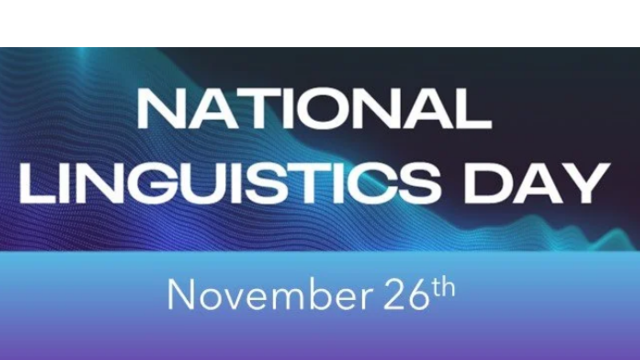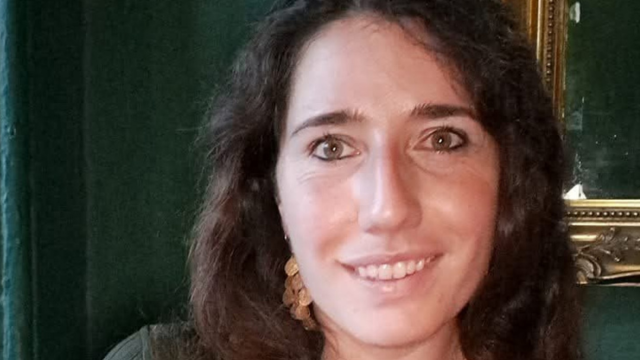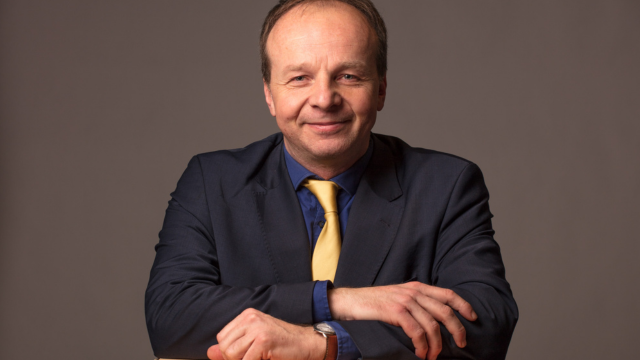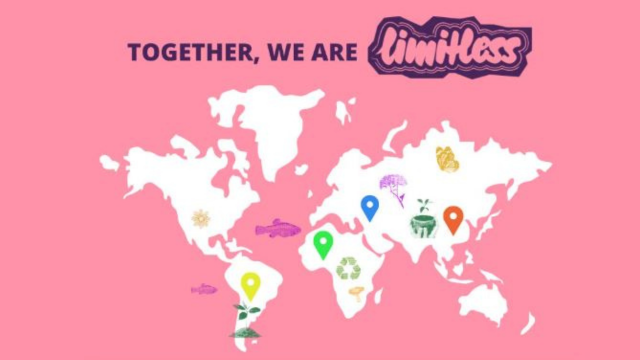-
QUALIFICATIONS
- For Linguists Worldwide
- For UK Public Services
- Preparation
- Policies & Regulation
-
MEMBERSHIP
- Join CIOL
- Professional Membership
- Affiliate Membership
- Chartered Linguist
- Already a member?
- Professional conduct
- Business & Corporate Partners
-
LANGUAGE ASSESSMENTS
- English
- All Other Languages
-
EVENTS & CPD
- Webinars & Events
- CIOL Conferences
- Networks
- CIOL Mentoring
-
NEWS & VOICES
- News & Voices
- CIOL eNews
- CIOL Awards
- The Linguist Magazine
- Jobs & Ads
-
RESOURCES
- For Translators & Interpreters
- For Universities & Students
- Standards & Norms
- CIOL & AI
- All Party Parliamentary Group
- In the UK
- UK Public Services
- Find-a-Linguist
Lost in translation? Professional identity in a changing landscape
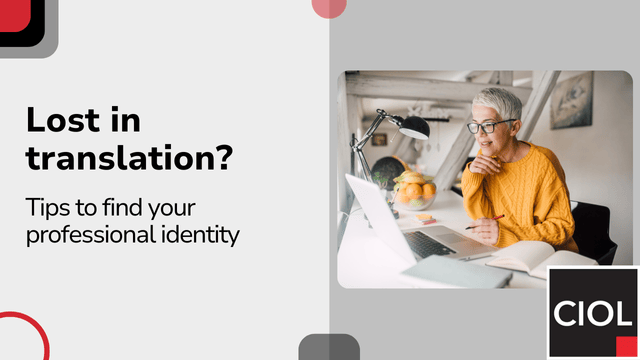
This is post two in a series of three follow-up posts to the CIOL roundtable Freelance linguists: navigating careers in a changing profession featuring Ilenia Goffredo, Karine Chevalier-Watts and Ibrahim Kadouni. It explores and expands on the panellists’ ideas and contributions. Watch the full roundtable video here.
What is happening?
‘We feel a little bit lost as linguists. Are we translators? Are we interpreters? Are we language consultants? Who are we?’
Ilenia Goffredo.
Between AI and geopolitics, many translators have been experiencing challenging times over the last year. As we consider our professional future, identity becomes a major influencing factor. While the core skills of translation remain fundamentally valuable, many linguists are exploring how their professional identity might evolve alongside changing market conditions.
What is professional identity?
Your professional identity is how you perceive and understand yourself in relation to your role, expertise and contributions within your profession. It encompasses your skills, values and behaviours that align with your professional standards.
Gillian Morris captured this concept well in a recent post for the CIOL on changing roles for translator linguists:
'A few years ago, I would have proudly and unhesitatingly announced that I was a translator, but more recently, the lines have become blurred. Am I really a translator now? My working hours are increasingly dominated by other language-related pursuits.’
Why might your professional identity matter?
In Atomic Habits, best-selling author James Clear explains the concept of ‘identity’ and its impact on everything we do, and our ability to make changes.
'Your behaviors are usually a reflection of your identity. What you do is an indication of the type of person you believe that you are, either consciously or nonconsciously. Research has shown that once a person believes in a particular aspect of their identity, they are more likely to act in alignment with that belief.’
As the years pass, people can become increasingly entrenched in their identities. And in the case of work, particularly when someone has a profession like being a translator, that profession becomes inseparable from who they are.
As Clear says:
‘When working for you, identity change can be a powerful force for self-improvement. When working against you, though, identity change can be a curse. Once you have adopted an identity, it can be easy to let your allegiance to it impact your ability to change.’
But we can change if we choose to.
Navigating identity issues
‘You feel lost in your identity as a linguist. You want to be a translator. You’ve studied to be a translator. You’ve studied to be an interpreter. But the reality is that the array of skills that you have to offer your clients now goes beyond the old perception of being a linguist.’
Ilenia Goffredo.
It takes a lot of time and effort to get the point where you can truly consider yourself a professional translator or interpreter. If someone chooses to explore adding new services to their offering, they can’t just assume that new identity overnight. And it isn’t only about the job. What if being a freelancer and working for yourself is part of who you feel you are?
'I really anticipated remaining freelance for the rest of my career … I decided to take the plunge and go into full-time employment. And at the time I felt a bit of a fraud. I felt a bit of a cheat because I thought, well, this isn’t what I was expecting to do,’
Karine Chevalier-Watts
A changing landscape
Let’s be clear on one point: translation hasn’t disappeared. For some, depending on languages, clients and sectors, traditional translation work continues much as before.
Others have seen changes such as incorporating post-editing, or adding services, but translators are still greatly needed, as we always have been.
No-one should feel they have to shrug off their identity or stop working as a translator. But the question is, can you still build as successful a freelance career as you could until recently, and can you earn what you need to doing that?
'The short answer is yes, but perhaps not following the old playbook. The landscape changed, and we have to too, as simple as that,’
Ibrahim Kadouni.
Three areas to explore in terms of professional identity
If you’re exploring evolution in your career as a linguist, here are some tips on three possible directions:
1. Diversifying
As Ilenia Goffredo observed:
‘It's a great time for us to start to question who we are, our identity. And this is I think the first step in trying to be successful in the years to come,’
Here are some moves that other linguists who are diversifying are making.
- Refining and expanding ‘pure’ translation services to offer a range of related services including interpreting, post-editing, subtitling, voiceover and proofreading and also new languages.
- Adding language teaching as an additional service.
- Offering in-house project management and quality assurance for companies with language departments, on a contract basis.
- Offering localisation consultancy and project management (or indeed working in-house in localisation departments).
- Specialising in app and video game localisation.
- Exploring AI-related language roles: training, prompt engineering, data annotation and quality evaluation.
- Offering copywriting and bilingual SEO to support more comprehensive marketing-related services.
- Taking competitive exams to work at international organisations such as the EU, UN and ILO.
- Stepping sideways into the adjacent world of publishing, in related work such as copyediting, developmental editing, proofreading and course writing, possibly in more than one language.
- Applying for in-house roles where languages are part of the job requirement.
- Doing other part-time jobs to bring variety and earnings resilience into your working week.
2. Getting even closer to clients
Ilenia Goffredo also noted:
‘You have to really understand and speak the same language as your clients. Because there are different clients: clients that want to use technology and leverage it a lot, but there are also clients that really value human interaction,’
Understanding your clients' pain points and their objectives can really help you to position yourself as a valued – and value-added - service provider who truly understands their needs. Article one in this series about solutions to a drop in translation work touched on the importance of client retention, and how it can be easier to keep than win new clients.
You might find it valuable to phone, Zoom or ask your some of your clients for a face-to-face meeting or a coffee, to ask them questions about their context and seek an even better understanding of their work to better ‘feel out’ how you can continue to help them.
3. Consider mentoring
If you're interested in shaping a new professional identity, it can help to talk it through with other linguists. Your professional identity is your professional future, so makes sense to mould it so aligns with your values, your life and your passions as much as possible.
Achieving work and career goals, finding your ideal work–life balance and doing something that feels right to you often benefits from some self-reflection, a trusted ‘sounding board’ and then considered action. If you are ready to explore the next stage of evolution in your professional identity, consider seeking support to help you succeed by working with a mentor or coach.
CIOL mentoring is there to help members share experiences and ideas and find their way in their careers. Alternatively, you can find an accredited career coach by searching for coaches registered with professional bodies in your country.
Still struggling with the idea of a changing identity?
Some linguists – and especially translators - find the thought of ‘putting themselves out there’ actively engaging with clients and talking about themselves a little daunting...
If that resonates, you’re going to love the final article in this CIOL Roundtable series about a 'success' mindset for introverted freelancers.

Gwenydd Jones is the founder of The Translator's Studio. She has broad experience as a content strategist in the worlds of localisation, writing, education and software.
Views expressed on CIOL Voices are those of the writer and may not represent those of the wider membership or CIOL.
Filter by category
More
The Chartered Institute of Linguists (CIOL), Incorporated by Royal Charter, Registered in England and Wales Number RC 000808 and the IoL Educational Trust (IoLET), trading as CIOL Qualifications, Company limited by Guarantee, Registered in England and Wales Number 04297497 and Registered Charity Number 1090263. CIOL is a not-for-profit organisation.

